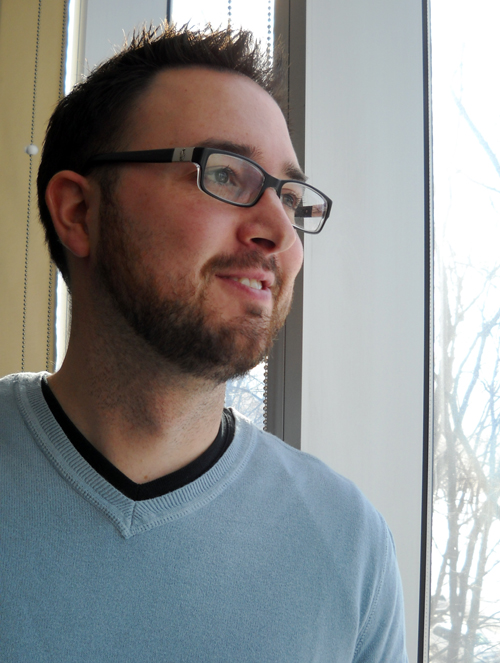
Helping to cure Parkinson’s disease and related disorders is the goal of research by newly arrived Guelph professor Scott Ryan.
Driven partly by family experience with Parkinson’s, he’s probing cellular workings to learn more about causes and potential treatments.
Having returned to Canada this winter from a post-doc in La Jolla, California, he’s one of four faculty members who have joined the Department of Molecular and Cellular Biology (MCB) within the past few months.
Coming back north has been a jolt, even for someone who grew up in Newfoundland and studied there and in Ottawa.
He and his wife, Tammy Ryan, drove from California first by trekking eastward and then heading north. In the Carolinas, the temperature was around 28 C. “But in Washington, there was a snowstorm, and it’s been a winter wonderland ever since.”
The Guelph professor studies cell signalling in the brain, or how neurons talk to each other. Neurons share neurotransmitter chemicals, including dopamine and glutamate, which stimulate nearby brain cells and strengthen connections needed for learning, memory and movement.
When dopamine-making cells die, the symptoms of Parkinson’s appear, including tremors, stiffness and slowness, loss of balance and rigid muscles. There is no cure.
Almost 100,000 Canadians have Parkinson’s, a neurodegenerative ailment that affects voluntary, controlled movement.
More than eight out of 10 of those people are over 65. That age group is expected to double to about 23 per cent of the population in the next three decades, according to statistics from Parkinson Society Canada (PSC).
Brain neurons mature in mid-teens, but Parkinson’s symptoms typically show up only around age 60, says Ryan. “At the point when you see tremors, they’ve already lost 95 per cent of their dopamine-making neurons.”
He’s interested in both genetic and environmental factors associated with the disease.
Last year, Ryan was lead author on a paper published in the journal Cell about pesticide exposure and connections to Parkinson’s.
He worked with Dr. Stuart Lipton at the Sanford-Burnham Medical Research Institute in California under a post-doc funded by PSC.
The team used two stem cell lines, one with the genetic mutation causing Parkinson’s, the other without. That kind of well-defined model “could give us a very powerful tool for identifying therapeutics,” he says.
In their study, healthy cells showed no measurable effects from low levels of pesticide. In diseased cells, those same chemical amounts altered the cells’ ability to activate genes, impaired cell function and led to higher levels of nitric oxide.
That gas is known to affect neural structures, says Ryan. Abnormally high amounts are found in people with neurodegenerative disorders such as Parkinson’s and Alzheimer’s disease.
Adding more toxins to healthy systems triggered similar changes. “A high dose essentially triggers it without any genetic cause.”
The team found only an association between pesticides and Parkinson’s, not a direct causal link. But Ryan says their study adds to growing evidence connecting those toxins and the disease.
One key pesticide, rotenone, is used in agriculture in the United States but is banned in Canada. “We need more regulation like that.”
Ryan sees his studies as helping in efforts to find a cure for the disease.
Both his grandfather and a great-uncle had Parkinson’s. When his grandfather died in 1990, researchers had yet to pinpoint any genetic cause for the disease and lacked reliable models for studying it. “In the last 15 years, the progress that’s been made in this disease is huge.”
Originally from Mount Pearl, Nfld., he studied biochemistry and nutrition at Memorial University of Newfoundland. For his PhD at the University of Ottawa, he looked at chemical messengers involved in Alzheimer’s disease.
Now at Guelph, he says his work meshes with that of other MCB newcomers, notably studies of stem cells and development by Prof. John Vessey and Prof. Jim Uniacke’s research on reactive oxygen species in cancer.
He plans to apply for PSC funding and for support from the Ontario Mental Health Foundation. Among his applications to federal granting agencies, he will seek support from the Canada Foundation for Innovation to outfit a neural stem cell lab in the Science Complex along with Vessey.
Ryan will join Guelph’s collaborative neuroscience program involving researchers across campus, notably in the departments of biomedical sciences and psychology.